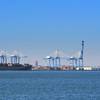UK Shipping Needs Time to Prepare for 2015 Emission Limits
The UK Chamber of Shipping says shipping needs more time to prepare for the 2015 0.1% sulphur limit introduction in the ECA's
The 2015 0.1% sulphur limit applies within the North Sea and English Channel and the Baltic Sea Emission Control Areas.
The Chamber's director of safety and environment, David Balston, said:
“We fully support the need to reduce sulphur emissions from ships – but we are particularly concerned that many routes will become non viable and for those vessels operating on them we seek transitional arrangements, including very tight time limited exemptions to allow technology to catch up and provide a realistic alternative."
These comments were made following the publication of a report by consultancy firm AMEC, commissioned by the Chamber on behalf of several North Sea and Western Channel shipping operators.
The report says that the targets for shipping companies to reduce their sulphur emissions by 2015, could cause adverse environmental effects and result in a loss of 2,000 maritime services jobs, and place many more industrial jobs under threat. The report is the first of its kind to examine the full impact of hitting sulphur targets.
The report shows the key impacts of hitting the 2015 sulphur reduction targets would be:
• Much more freight moved by road, rather than sea – increasing carbon emissions and causing more road congestion
• Up to 2,000 jobs put at risk in maritime engineering, navigation, catering, customer services, and other areas
• An increase of 2.8p per litre for the cost of road diesel
• Significant increases (up to 29% in some cases) in the cost of passenger and container route ticket prices.
The UK Chamber and the shipping operators who commissioned the report agree that there is a clear and unequivocal need to reduce sulphur emissions from shipping for both environmental and health reasons. However they warn that the speed at which shipping operators would be required to meet reduction targets, at huge cost, without sufficient technology in place to support the changes, along with the failure to date for these targets to take account of the overall need to reduce carbon emissions has been causing ship operators great concern for some time.












